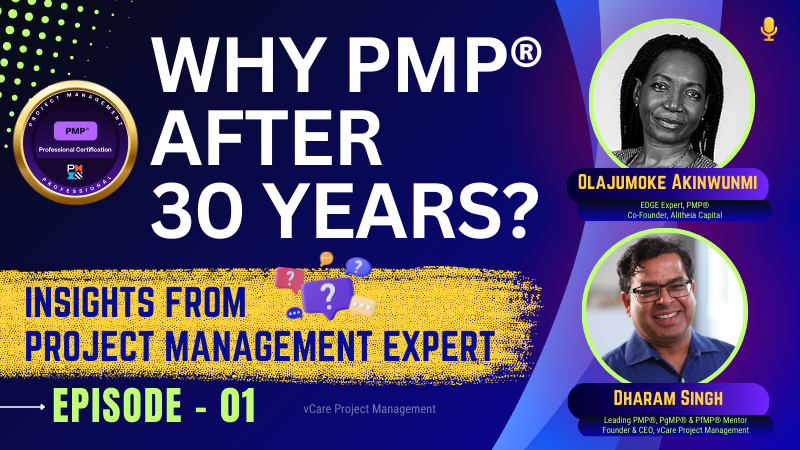
Why PMP Still Matters After 30 Years in Project Management Experience | Olajumoke Akinwunmi

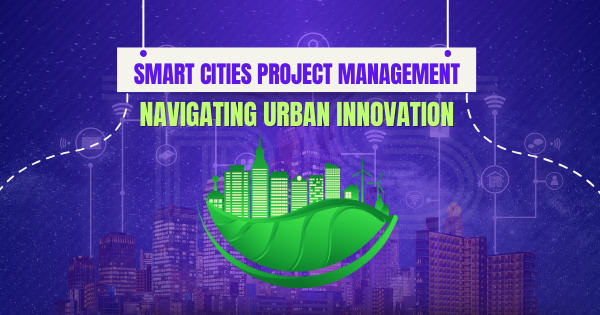
Introduction: Navigating Urban Innovation in Smart Cities Projects
Living in the fast changing world, the goal of creating smart cities has become crucial due to the increase in urban population, posing previously unheard of demands on government, infrastructure, and resources. A specialist in project management sees such a complicated endeavor as a unique combination of sustainability, technology, and stakeholder engagement. Smart cities are now a manifestation of how data-driven decision-making, adaptable technologies, and citizen-centric design are changing urban challenges. Thus, in order to develop solution that are technologically sound, socially and economically viable, project managers must be exact in managing smart city projects by utilizing novel frameworks and techniques.
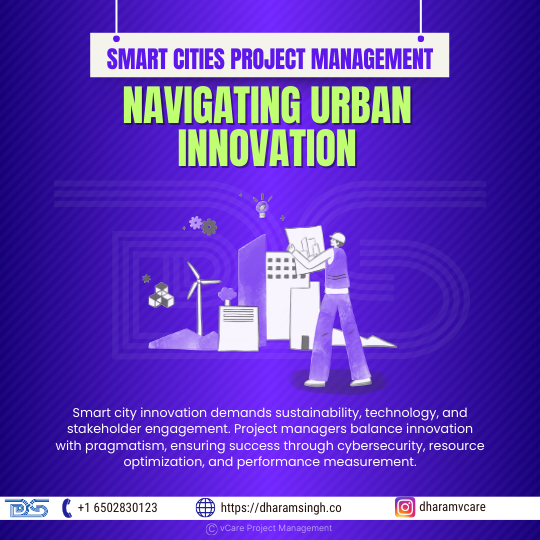
Empowering project managers to navigate urban innovation and sustainability in smart cities.
In this article, we can explore the critical role of project management in managing smart city projects toward success. We will also address about topics like cybersecurity, resource optimization, stakeholder alignment, and performance measurement, all of which are framed within the idea of striking a balance between innovation and pragmatism to make sure that smart cities fulfill their promises of improved urban living and sustainable development.
Urbanization and the Project Manager’s Role
According to predicts, about 68% of the world’s population will reside in urban regions by 2050, indicating that the globe is growing more and more urbanized. Cities are growing at a rapid pace, which presents potential as well as difficulties, particularly for the creation of smart cities that leverage digital solutions to improve livability. In this shift, project managers play an essential part in organizing, carrying out, and supervising urban projects that use cutting-edge technology.
The essence of smart cities.
In order to make better decisions and improve living standards, smart cities make use of data and digital technology. According to McKinsey & Company, smart city programs may significantly affect safety, health, and environmental quality, among additional aspects of city life.
Project Managers: Catalysts in Urban Transformation
Project managers are necessary change agents for the process of urbanization and smart city project. The UN-Habitat research from 2021 looks at urbanization patterns and the vital role project managers play in the creation of sustainable cities. Their role includes:
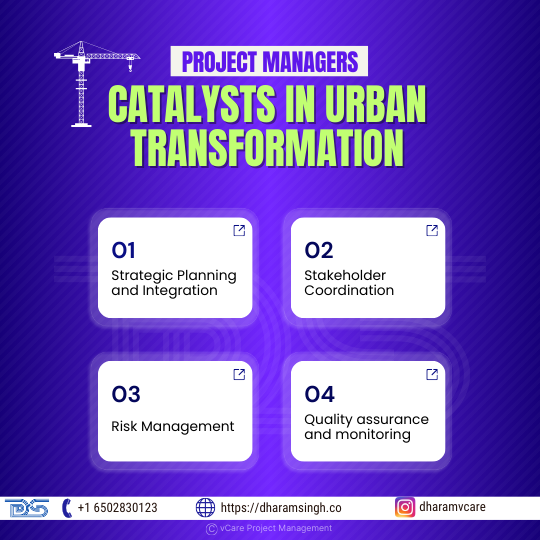
Project managers play a vital role in urban transformation by ensuring strategic planning, stakeholder coordination, risk management, and quality assurance for sustainable growth.
Case Studies: The Successful Practice of Project Management in Smart cities
Urbanization is currently transforming cities globally, as the case studies indicate, and this needs more than ever on having competent project management skills. In order to guarantee the most effective and livable urban ecosystems possible for all smart city project applications, project management specialists need to make sure that complicated projects are properly and efficiently coordinated. With the advent of digital technologies and collaborative participation, they therefore play a crucial role in altering modern cities.
Ways to engage stakeholders strategically in Smart Cities
As smart city projects develop rapidly, integrating a variety of interests into urban development requires a systematic approach to stakeholder engagement. This is due to the fact that effective stakeholder management makes sure that technical advancements fulfill the requirements and expectations of all stakeholders.
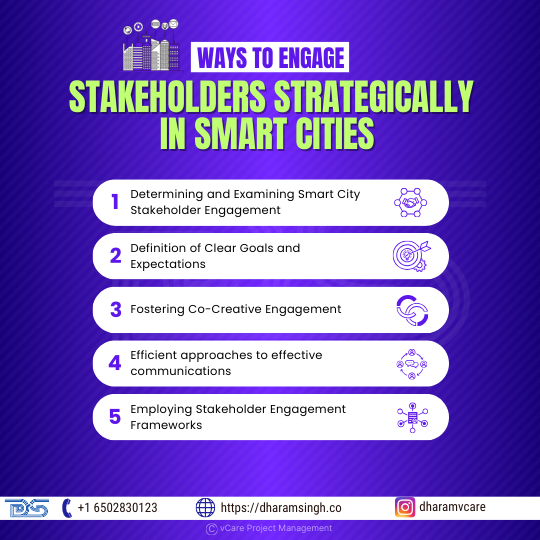
Discover five key strategies to engage stakeholders effectively in smart cities for sustainable urban transformation.
Strategic stakeholder engagement begins with thorough identification and analysis. Governmental organizations, business partners, academic institutions, and the public are all included as stakeholders with an interest in the project’s development. Understanding their influence, interests, and possible impacts on the project is important. Stakeholder role profiles may also be useful in this analysis’s setting since they provide a framework for defining the project’s general roles and responsibilities.
Explicit objectives and expectations need to be defined right from the start. This gives all stakeholders clear direction and their roles in the project. Having a clear goal at each phase of a project’s life cycle ensures that expectations are set early so everyone knows exactly what they have to do to be successful.
Stakeholders will be encouraged to actively participate in the decision-making process if a co-creative method is used. By encouraging interaction, a collaborative approach incorporates the range of skills into the tool to create a sense of ownership and interest. Engaging with stakeholders is a key component of positive relationships that also contributes to project success.
Effective participation from stakeholders is built on transparent and consistent communication. Cooperation and understanding are enhanced when communication strategies are modified to accommodate various stakeholder groups. It need frequent updates, conversations, and feedback platforms to preserve confidence and quickly resolve issues. Effective stakeholder relationship management requires the establishment of clear communication channels and procedures.
Stakeholder engagement procedures may be evaluated and enhanced with the use of formal frameworks, such as maturity models. These methods guarantee that stakeholder involvement advances with the project by providing a methodical way to assess current engagement levels and pinpoint opportunities for development.
Thus, strategic engagement of stakeholders in smart cities is extremely challenging and requires broad participation, thoughtful planning, and flexible communication. The ability to further match the interests of many stakeholders with the inclusive and sustainable development of urban settings is improved by structured frameworks.
Smart City Financing: A Project Management Perspective
By combining cutting-edge technology, the emerging smart cities will revolutionize urbanization and enhance economic development, environmental sustainability, and quality of life. Nonetheless, funding these complex projects continues to be a major obstacle. From the perspective of project management, the effective realization of smart city projects depends on comprehending and putting into practice different finance options.
Innovative Financing Strategies
Traditional funding methods often fall short in addressing the extensive financial requirements of smart city projects. Consequently, municipalities and project managers are exploring alternative financing mechanisms, like:
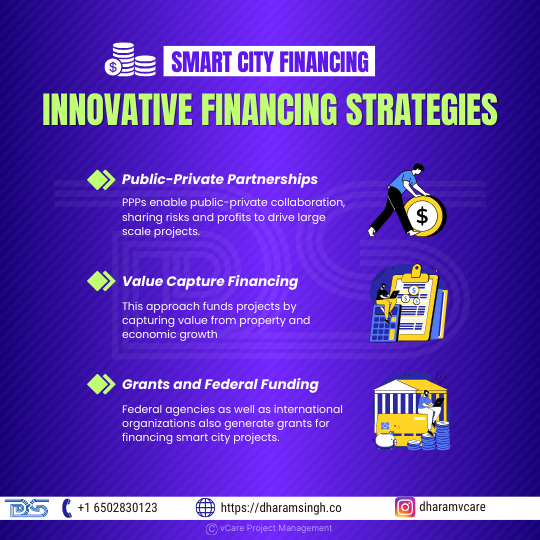
Unlock smart city growth with innovative financing strategies, including public-private partnerships, value capture, and federal funding.
Role of Project Managers in overcoming the complexities of smart city financing:
Challenges and Considerations
Several challenges persist even though innovative financing options exist:
Smart city projects can be financed by project managers through a diversified approach that incorporates innovative funding strategies and effective project management practices. They can overcome fiscal challenges by leveraging diverse financial instruments and fostering collaborative partnerships to pave the way for the development of sustainable and intelligent urban environments.
Ensuring Data Integrity and Privacy in Projects
Project managers must ensure data integrity and privacy are paramount for the successful execution of smart city projects as urban areas increasingly adopt interconnected technologies.
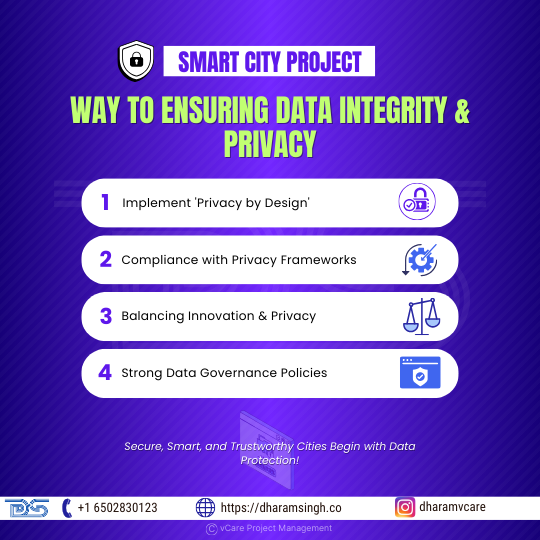
Building secure and trustworthy smart cities with strong data privacy and governance policies.
Embedding ‘privacy by design’ principles within the project lifecycle ensures that the project includes data protection measures from the outset. It ensures that the systems are structured to collect only necessary data to avoid exposing more information that may cause a breach. Anonymizing personal information at the point of collection ensures that individuals cannot be identified. This, in turn, improves the privacy of cities.
The organization adopts a comprehensive framework on privacy by structuring how data is handled. The framework supports the existence of robust cybersecurity programs that minimize data access and use stringent safeguarding measures. This is what addresses privacy issues and creates trust in smart cities among the people.
Technology presents many benefits to society, though it also raises legitimate questions about privacy. For instance, Amsterdam scrapped the smart traffic lights project because excessive data collection posed a potential surveillance threat. This requires project managers to balance innovation against privacy concerns by ensuring that data collection is transparent to respect individuals’ rights.
It is important to develop and enforce clear data governance policies that provide guidelines on the collection, usage, and retention of data to ensure compliance with legal standards and ethical norms. Regular data protection impact assessments will help identify potential risks and mitigate them, ensuring the integrity of the project and protecting the interests of stakeholders.
Smart city project managers need to ensure data integrity and privacy with protective measures incorporated in the design and implementation of such projects. They create systems resilient enough to protect sensitive information from improper access while maintaining public trust by using existing privacy frameworks, ensuring an appropriate balance between innovation and privacy concerns, and settling on clear data governance policies.
Technology Integration and Change Management
Effective change management is required to ensure successful adoption and minimize disruptions when integrating new technologies into organizational processes. Project managers play a crucial role in facilitating this integration by implementing structured change management strategies. With an emphasis on technology adoption and change management, the World Economic Forum white paper offers lessons from smart city experiments throughout the globe.
Understanding the changes that new technology will support before implementation is essential. Identifying and understanding these changes is necessary to align technology with organizational goals and prepare the team for change. This approach ensures that technology improves processes without causing disruptions.
Leading the project team and stakeholders requires establishing and sharing clear goals. Setting and achieving specific goals will help them stay on course and track their development. Effective communication also makes it easier for individuals to comprehend the advantages and reasons behind the new technology. In this sense, transparency fosters an open working atmosphere throughout the transition.
Building a skilled and adaptable team is essential for managing technological change. Team members must have the required expertise and be willing to learn and adapt to new tools and processes. A unified team can successfully tackle challenges and propel the project towards successful implementation.
A well-defined plan defines the procedures to accomplish the introduction of the new technology, encompassing schedules, resource distribution, and risk mitigation strategies. The probability of project delays or failure is decreased by this strategic planning, which foresees possible problems and develops responses beforehand.
Employees need adequate training and support for successfully implementing new technology. Organizations should design training programs for different user groups to ensure everyone feels confident and competent using the new systems. Ongoing support mechanisms also help address any post-implementation issues.
An effective project manager would manage to smoothen the organizational life and realize objectives by integrating this new technology within the organization processes in those areas.
Sustainability and Resource Optimization
Sustainable urban development plays a significant role in achieving environmental preservation and maximizing the use of resources. A city’s strategy for balancing environmental conservation and optimized resource use plays a crucial role in adopting approaches that help alleviate the growing urbanization demands of the world. Green infrastructure which includes the presence of parks and urban forests serves as an effective way to boost the aesthetic value of cities while maintaining a vital aspect of air quality improvement, temperate regulation, and biodiversity in urban areas.
Mixed-use zoning is another important strategy that reduces reliance on long commutes. Combining residential, commercial, and recreational spaces within proximity promotes walkability and creates self-sufficient neighborhoods. This reduces vehicular emissions, contributing to cleaner air and lower carbon footprints.
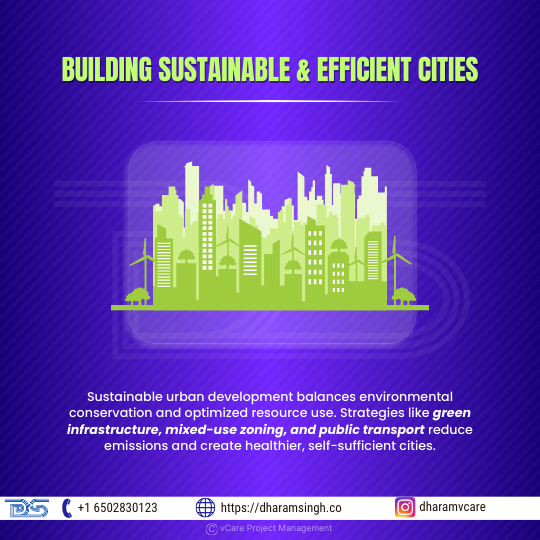
Building greener and more efficient cities with sustainable urban development strategies.
Public transport also involves investment in efficient and accessible public transport systems that reduce reliance on private vehicles. By promoting using buses, trains, and other shared transport, cities can easily minimize traffic congestion and pollution.
By using these measures, cities can develop sustainably, allowing for the balance of human activity with the environment. Incorporating green infrastructure, mixed-use zoning, and public transportation will enable cities to create a resilient future, where people and nature can coexist harmoniously.
Agile Governance for Complex Smart City Projects
Agile governance in complex smart city projects requires flexible and responsive approaches to manage the dynamic nature of the urban environment. Adaptive governance frameworks enable cities to respond promptly to technological developments and changing citizen needs. By formulating a clear vision, designing adaptive systems, and building intrinsic agility, cities can enhance their resilience and better serve their populations.
Engaging citizens in governance structures is very important. Involving residents in the smart city projects will ensure that they align with public interests and bring a sense of community ownership. Collaborative governance models, where citizens and stakeholders actively participate in urban governance, contribute to more effective and accepted smart city interventions.
Agile governance, therefore, will help stakeholders proactively address the ethical issues, ensuring that technology implementation is effective and equitable. Cities leverage agile governance to address the complexity involved in smart city projects by promoting innovative yet resilient environments.
Performance Metrics: From Planning to Execution
To actually plan and implement smart city projects successfully, a project leader must establish appropriate performance metrics. These metrics provide a framework for assessing the level of progress, identifying areas for improvement, and ensuring projects comply with larger urban development objectives.
Key Performance Indicators (KPIs) Framework
A well-rounded KPIs framework assesses all the different dimensions that comprise a smart city economy, environment, and society/culture. It thereby ensures all aspects critical to the balanced and sustainable development of cities.
Monitoring Progress and Impact
Cities can measure the direct and indirect benefits of smart city technologies using a structured measurement framework. Decision-makers can use data analysis across sectors to make informed choices, optimize resource allocation, and enhance service delivery to citizens.
Continuous Monitoring and Adaptation
Cities can better adapt to emerging circumstances and evolving challenges through regular monitoring of performance metrics. This dynamic makes smart city projects responsive and relevant.
The strong performance metrics are crucial for guiding smart city projects from the planning phase to execution. A comprehensive KPIs framework enables cities to effectively measure success, drive continuous improvement, and realize their smart city objectives.
Conclusion: Driving Success in Smart Cities Projects
Navigating urban innovation in smart cities presents a number of challenges for project managers, ranging from resource allocation and stakeholder engagement to data security and technical integration. The future of urban living will be shaped by these smart city projects, thus complexity need strategic vision, flexible approaches, and an unwavering dedication to sustainability.
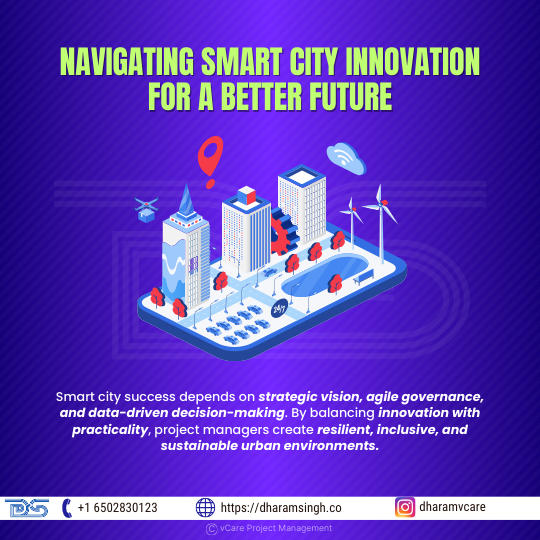
Navigating smart city innovation to build resilient and inclusive urban environments.
Effective project management is the backbone of smart city projects, which allows for seamless coordination of diverse teams, robust financial planning, and the implementation of cutting-edge technologies. Project managers can ensure that smart city projects not only meet their objectives but also set benchmarks for scalability and impact by embracing frameworks such as Agile governance, advanced performance metrics, and stakeholder engagement strategies.
The path to successful smart cities lies in striking a balance between innovation and practicality, where technology is translated into tangible benefits for individuals. In this regard, the challenge for the project management experts is not to deliver projects within time and budget but to implement meaningful transformations to enhance urban resilience, inclusivity, and quality of life.
The KPMG global study on smart city transformation success outlines important factors that drive urban innovation and excellence in execution. The KPMG report on the transition of smart cities highlights:
Thus, a proactive and collaborative approach by project managers can turn the vision of smart cities into reality, creating urban environments that are not only intelligent and efficient but also human-centric and future-ready.
#SmartCities #ProjectManagement #UrbanInnovation #Sustainability #DigitalTransformation #FutureCities #pgmp #pfmp #pmicertifications #dharamsinghpmp #dharamsinghpfmp #dharamsinghpmp
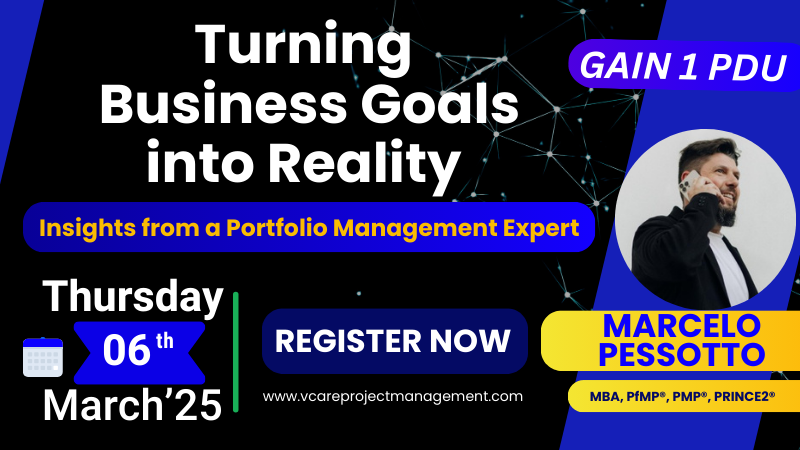
🚀 Elevate Your Project Portfolio Management Expertise! | Exclusive Webinar with Marcelo Pessotto, MBA, PfMP, PMP, PRINCE2
Are you ready to turn business goals into reality with strategic portfolio management?
Join me for an exclusive live webinar featuring Marcelo Pessotto, a highly respected IT Project, Program, and Portfolio Management professional with over two decades of experience from Orlando, Florida, USA.
🔗 Reserve Your Spot Now: https://bit.ly/4hhH4Yu
📅 Session Date: Thursday, March 6, 2025
⏰ Session Time:
09:30 AM – 10:30 AM (PST) / 10:30 AM – 11:30 AM (MST) / 11:30 AM – 12:30 PM (CST) / 12:30 PM – 01:30 PM (EST) / 02:30 PM – 03:30 PM (BRT) / 05:30 PM – 06:30 PM (GMT) / 06:30 PM – 07:30 PM (CET) / 08:30 PM – 09:30 PM (AST) / 09:30 PM – 10:30 PM (GST)
🎯 Key Takeaways from the Webinar:
✔ Navigating Complex Stakeholder Ecosystems in High-Stakes Projects
✔ Avoiding Pitfalls in Translating Business Strategies into Actionable Portfolios
✔ Redefining Success: Beyond ROI and Time-to-Market in Portfolio Management
✔ Balancing Innovation and Stability in High-Risk Portfolio Environments
✔ Integrating Squad-Based Teams into Traditional Portfolio Structures
✔ Transforming Vision into Reality: Grounded Strategies for Long-Term Success
✔ The Power of Empathy in Managing Multicultural Teams for Customer-Focused Success
✔ Embedding Sustainability in Modern Portfolio Management Practices
💡 Bonus for Attendees: Earn 1 Professional Development Unit (PDU) and get access to a special discount code for our upcoming PMP, PgMP, PfMP, and PMI-ACP programs.
📞 Have Questions About Your Project Management Career?
You can book a free 15-minute consultation with me to discuss training, certifications, and career growth in PMI certifications.
👉 Schedule here: http://talktodharam.com
🎥 Want to Stay Updated with Project Management Insights?
🔔 Subscribe to vCare Project Management YouTube Channel for Q&A sessions, certification success stories, and expert discussions. 🔗 https://bit.ly/2YF0wJl
🎙️ Follow My Podcasts & Expert Interviews:
🔗 https://bit.ly/2NDY8wd
💬 Which challenge do you face the most in managing portfolios? Drop your thoughts below! 👇
#PgMP #PfMP #PMP #vCareProjectManagement #DharamSinghPfMP #DharamSinghPgMP #PortfolioManagement #ProgramManagement #PMICertification #StakeholderEngagement #MarceloPessotto
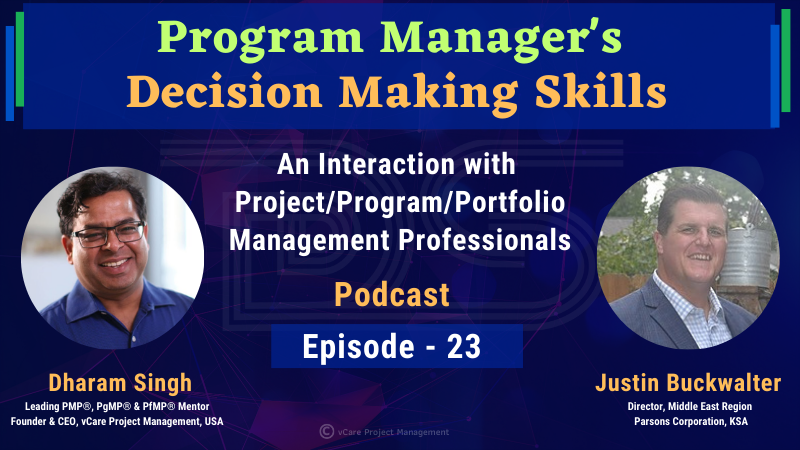
Program Managers Decision Making Skills | Justin Buckwalter | Program Management Insights Episode 23
🎥 Watch now: https://www.youtube.com/watch?v=MkmY_BJYEik
📚 Discussion Topics:
– Reflecting on Peter Drucker’s quote: “Whenever you see a successful business, someone once made a courageous decision.” How do you make courageous decisions in program management to navigate uncertainty and ensure project success?
– How do you address behavioural biases and analysis paralysis to ensure efficient and timely decision-making in your program management practice?
– Considering the World Economic Forum’s ‘Future of Jobs Report 2023’, which identifies critical thinking and decision-making as top skills for future professionals, how do you and your team strengthen these skills, and what decision-making frameworks or practices do you find most valuable in program management?
– How do you integrate feedback mechanisms across your program management practice to improve decision-making, and what broader lessons can you share from this process?
– Michael Porter often emphasized that “the essence of strategy is choosing what not to do.” How do you prioritize program objectives and decide what to exclude to ensure strategic alignment while balancing stakeholder expectations and resource constraints?
– What initiatives are companies taking to balance the integration of AI and machine learning with traditional decision-making processes in program management?
– How does ethical leadership influence success in contemporary projects, and what traits are organizations prioritizing in their leadership development programs?
– Regarding upskilling, what specific programs or training do you see as most beneficial for program managers to enhance their decision-making capabilities in the face of rapid technological change?
– How are current trends and challenges in program management influencing the strategic priorities of organizations, and what steps are being taken to equip managers with the skills needed for future challenges?
🚀 Looking to deepen your knowledge? Check out our upcoming webinars featuring global experts,
1. Culture, People, Programs, Risks: Leadership Redefined featuring Lucie Ellis – https://bit.ly/3VXv4mW
2. Turning Business Goals into Reality featuring Marcelo Pessotto – https://bit.ly/4hhH4Yu
3. Resilient Leadership in Cyber-Driven Programs: Strategies from a Transformation Expert featuring Dr. Maria Sette – https://bit.ly/4j9fmPA
– Book an obligation-free consultation session on Project management Career, training, and certifications: http://talktodharam.com
#ProgramManagement #DecisionMaking #LeadershipDevelopment #PgMP #PfMP #PMP #StrategicLeadership #ProjectSuccess #CriticalThinking #ProgramManager #StakeholderEngagement #AIIntegration #EthicalLeadership #FutureOfWork #RiskManagement #AskDharam #VCareProjectManagement
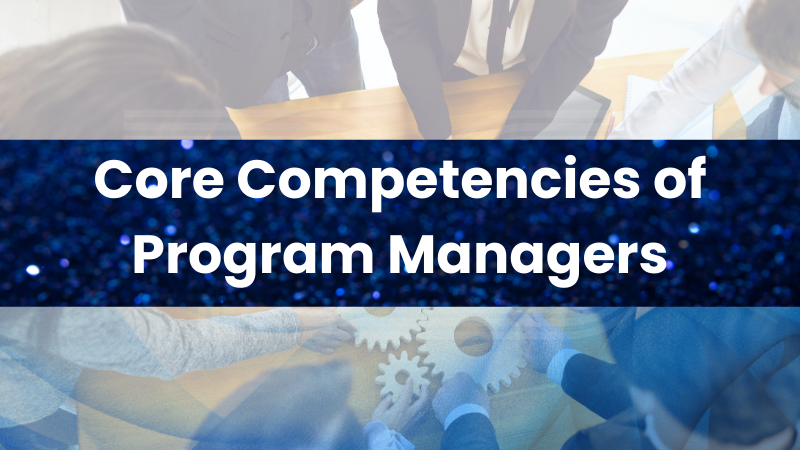
Top 10 Core Competencies of Program Managers | Skills for Success | Dharam Singh & vCare Project Management
There are many similarities between a good program manager and a good project manager. However, a program manager must have broader organizational knowledge than a project manager. In addition, programs frequently necessitate strategic visioning and planning skills to align overall program goals and benefits with the organization’s long-term goals.
Here are the top ten core competencies of Program Managers:
1. Leadership and Teamwork
2. Planning and Organizing
3. Communication
4. Ethics and Ethical Values:
5. Internal and External Stakeholder Engagement
6. Political Understanding
7. Knowledge management
8. Financial Management
9. Risk management
10. Project and Process Management
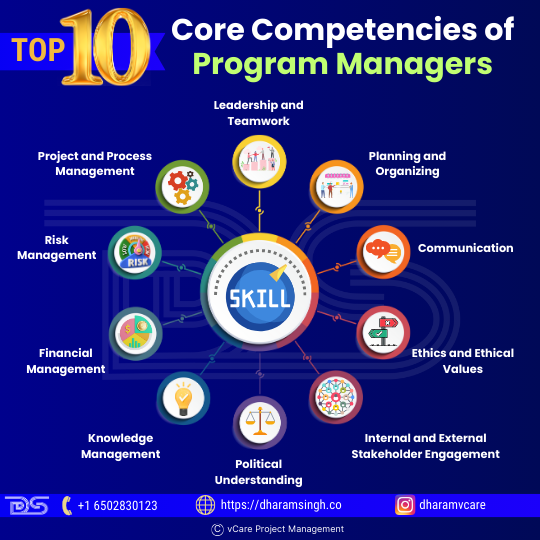
What makes a great program manager? Explore the top 10 core competencies essential for program success with insights from Dharam Singh & vCare Project Management!
🚀 Looking to deepen your knowledge? Check out our upcoming webinars featuring global experts,
1. Innovative Project Management Practices featuring Olajumoke Akinwunmi – https://bit.ly/3ZxZOx4
2. PMO Digital Transformation Leadership: Insights and Success featuring Sherwyn Cambridge – https://bit.ly/4iMvyWE
3. Culture, People, Programs, Risks: Leadership Redefined featuring Lucie Ellis – https://bit.ly/3VXv4mW
4. Resilient Leadership in Cyber-Driven Programs: Strategies from a Transformation Expert featuring Dr. Maria Sette – https://bit.ly/4j9fmPA
– Book an obligation-free consultation session on Project management Career, training, and certifications: http://talktodharam.com
– Discover training offers and certification discounts: https://bit.ly/3jWVepD
– Stay updated with our Q&A series and certification success stories by subscribing to the vCare Project Management YouTube channel at https://bit.ly/2YF0wJl
– Follow my podcasts and interviews with Project Management Experts on YouTube at https://bit.ly/2NDY8wd
#ProgramManagement #ProgramManager #ProjectManager #ProjectManagement #StrategicPlanning #StakeholderEngagement #CommunicationSkills #EthicsInLeadership #RiskManagement #FinancialManagement #Leadership #Teamwork #KnowledgeManagement #OrganizationalGrowth #ProgramLeadership #PgMP #PfMP #PMP #ProcessManagement #BusinessStrategy #ProgramSuccess #PoliticalAwareness #ManagerialSkills #AskDharam #DharamSingh #DharamSinghPgMP #DharamSinghPfMP #DharamSinghPMP #vCareProjectManagement
🚀 Why Pursue PMP After 30 Years in Project Management? 🎙️
I had the privilege of speaking with Olajumoke Akinwunmi, EDGE Expert, PMP®, and Co-Founder of Alitheia Capital, in the first episode of our latest podcast series: “Innovative Project Management Practices.”
🔹 What made her pursue PMP after nearly three decades in project management?
🔹 How has PMP helped her refine her approach to managing real estate and investment projects?
🔹 What role does PMP play in establishing credibility, mentorship, and stakeholder management?